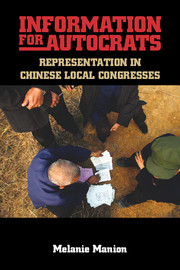Book contents
- Frontmatter
- Dedication
- Contents
- Tables and Figures
- Acknowledgments
- Introduction
- 1 Institutional Design
- 2 Selectoral Connection
- 3 Authoritarian Parochialism
- 4 Putative Principals
- 5 Independent Candidates
- Conclusion
- Appendix A Interviews and Surveys
- Appendix B Reliability Check on Delegate Self-Reports
- Appendix C Searching Independent Candidates on Sina Weibo
- Works Cited
- Index
- Miscellaneous Endmatter
Conclusion
Published online by Cambridge University Press: 05 December 2015
- Frontmatter
- Dedication
- Contents
- Tables and Figures
- Acknowledgments
- Introduction
- 1 Institutional Design
- 2 Selectoral Connection
- 3 Authoritarian Parochialism
- 4 Putative Principals
- 5 Independent Candidates
- Conclusion
- Appendix A Interviews and Surveys
- Appendix B Reliability Check on Delegate Self-Reports
- Appendix C Searching Independent Candidates on Sina Weibo
- Works Cited
- Index
- Miscellaneous Endmatter
Summary
This book tells two parallel stories. The first story, told mainly in Chapters 1 to 3, is a story of representation by design. New electoral arrangements structure opportunities for representation; the decades-old Communist Party personnel management system assures the relevance of representation. In these chapters, representation in Chinese local congresses is an institutionalized flow of local knowledge from ordinary citizens and amateur congress delegates at the grassroots to powerful executives in local party committees and governments, to which the powerful respond. In particular, representation is an input in executive decisions about where to allocate what local public goods as a strategically responsive act of local governance.
Congress delegates are the pivot in this story. Autocracies, especially single-party autocracies, are much worse than are liberal democracies at solving the fundamental moral hazard problem for voters in their agency relationship with politicians. With little to help ordinary citizens monitor what congresses do, elections in autocracies cannot effectively sanction (and thereby constrain) congress delegates to be accountable to their constituents. Nonetheless, delegates in Chinese local congresses mostly see themselves and act as agents of their constituents. Why? An institutionalized “propitious selection” into congresses of a substantial number of “good types,” individuals inclined by their personal characteristics to represent their constituents, is only part of the story. Legally mandated contested elections, secret ballots, and voter nominees make electoral legitimacy a uniquely flattering story for all winners of popular elections. Beliefs of congress delegates, even an exaggerated sense of self-importance in their relationship to local governments, are mostly supportive of representation. That electoral legitimacy is also the official story of why delegates are delegates does not make it a sham. Indeed, for ambitious “governing types,” including delegates who are also officials in local party and government agencies, the official story is part of the incentive structure in a system of career advancement managed by the Communist Party. In sum, local congressional representation in China, as presented empirically in Chapters 1 to 3, is an institution in the standard way: it is a regularized pattern of actions and beliefs, structured by incentives, although not the incentives suggested by the classic agency perspective on elections in the literature on modern political economy. All this, however, is a story about political elites.
- Type
- Chapter
- Information
- Information for AutocratsRepresentation in Chinese Local Congresses, pp. 150 - 154Publisher: Cambridge University PressPrint publication year: 2015



